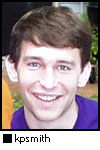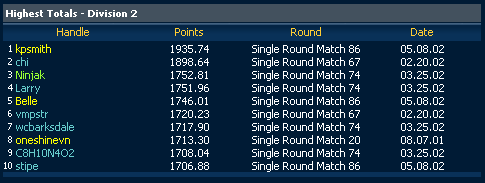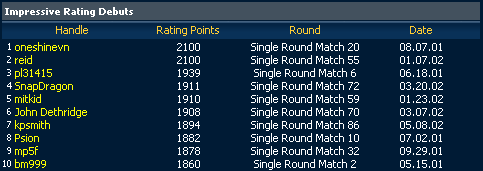
|
First-Time Phenomenal
kpsmith Makes TopCoder History In Debut Match
Wednesday, May 15, 2002
By Adam Loss,TopCoder Staff Writer
 Rookies. Showing up as a rookie can sometimes be tough. Sure, there are those
well-known rookies who come along with a big reputation, and are able to succeed
right from the start of their careers. Most, however, must go through the growing
pains of their initial experience. The isolation, the loneliness of not knowing
anyone, and the uncertainty of what you're supposed to do and what's expected.
Most often they just observe what's going on around them, quietly learn how to
master their domain, and make an impression sometime down the road. While it's
no surprise when a known commodity achieves greatness, what if the debut performance
by one of those unknown rookies included an all-time record such as: five home runs,
seven touchdowns, or 101 points in a basketball game?
Rookies. Showing up as a rookie can sometimes be tough. Sure, there are those
well-known rookies who come along with a big reputation, and are able to succeed
right from the start of their careers. Most, however, must go through the growing
pains of their initial experience. The isolation, the loneliness of not knowing
anyone, and the uncertainty of what you're supposed to do and what's expected.
Most often they just observe what's going on around them, quietly learn how to
master their domain, and make an impression sometime down the road. While it's
no surprise when a known commodity achieves greatness, what if the debut performance
by one of those unknown rookies included an all-time record such as: five home runs,
seven touchdowns, or 101 points in a basketball game?
Simple. They'd garner immediate attention and notoriety, which is exactly what has been brought upon kpsmith, who in Single Round Match 86, his initial TopCoder competition, earned a Division-II record 1935.74 final points. That point total broke the Division-II record of chi, who earned 1898.64 final points in Single Round Match 67 in February.

The final point total of kpsmith is also TopCoder's all-time point record, 8.35 more than the 1927.39 total of vulture in Single Round Match 1, which strangely enough occurred exactly one year (May 8, 2001) from the date kpsmith broke the record (May 8, 2002). kpsmith also broke the record for the most points earned in a debut match, which was held by Aleksey, who earned 1787.55 final points in the Second Round of the 2001 TopCoder Collegiate Challenge. Lastly, kpsmith had a debut rating of 1894, which is the seventh highest ever.

The Match
Although not cocky, kpsmith had a positive feeling about his first TopCoder match. "I knew I had a good chance to do well, but you never know when a particular problem will cause you grief. I figured I had a 50/50 chance of winning $100."
kpsmith played it smart prior to his initial match. After becoming a member on April 20, kpsmith put himself through his own version of spring training. "I went to the practice rooms and did some of the problems. After doing them, I read other people's solutions and figured out what I could have done better. Then I rewrote them. Frankly, I didn't know anything about the C++ STL until three weeks ago when I started browsing this site. Now I know it pretty well, mostly from reading other people's submissions."
kpsmith got off to a quick start, submitting code for the Level One problem in 3:06 for 296.46 points. He then spent 4:10 on the Level Two problem and earned 538.43 points, and finished the Coding Phase of the competition with 1685.74 points by completing the Level Three problem in 6:53 for 850.85 points. That total put him in first place in Room 62, 48.97 points ahead of ekrips.
"After writing solutions for the problems, I first chatted with the system testers for 30 minutes, then for the next 30 minutes I chatted with other people in the room and tried to think of what kind of bugs I should be looking for during the Challenge Phase."
That must have been quite a chatting and thinking session, since in the next 15 minutes, kpsmith would make TopCoder history by adding 250 points to his total with five successful challenges. kpsmith takes us through the Challenge Phase:
"About five minutes before it (the Challenge Phase) started, one person asked how one of the players (ekrips) managed to get 898 points on a 900 point problem. No one answered, but clearly several people realized that he must have submitted empty code. So once the Challenge Phase started, we all raced to that problem and challenged it as quickly as we could. Alas! I typed in one of the inputs incorrectly, including a space where they were not allowed. By the time I had correctly formatted my challenge, the problem had already been challenged by someone else (floris)!
After that, things went uphill. I realized with the Level One problem that people were unlikely to code for handling 0 properly (when looking for the lowest digit in a number - a typical loop might skip over the case of 0 completely and return some incorrect default value). So, I managed to challenge three of the Level One problems quickly with that bug. Another one was just completely wrong and wouldn't have passed any of the example tests.
By that time, floris had examined all of the Level Three problems and already challenged one. I took a quick look at the others and didn't see anything blatant. I then got lucky stumbling across a Level Two problem where the coder (tzesti) had clearly misread the problem. If anyone else had gotten to it first, they would certainly have seen the problem just as quickly."
What makes the final point total of kpsmith even more impressive, is how much better it was than the average Division-II coder on each problem. For instance, the average coder earned 260.88 on the Level One problem, 35.58 less than kpsmith, 463.77 on the Level Two problem, 74.66 less than kpsmith, and 566.51 on the Level Three problem, an amazing 284.34 less than kpsmith. Even more amazing than the discrepancy in points related to the average, is that he earned that many points when only 36.9% of the competitors who submitted code for the problem were actually correct.
"I was a little surprised, and pleased, at the margin of victory! I always do better when I'm under stress and time pressure, though. So even though I've never gone through three problems quite that smoothly in the practice rooms before, I'm not too surprised that I did particularly well under competitive pressure."
After the match, kpsmith logged off and went to bed, unaware of his achievements. "My friend digitalbeing pointed it out to me the next morning. It certainly felt good."
Peer Reactions
"kpsmith is one of the brightest and most analytical engineers I know," remarked digitalbeing, when asked if he thought his friend kpsmith was capable of a performance like this. "I was not surprised that he did so well in his debut; kpsmith is a highly proficient programmer who is equally adept at defining efficient system architectures and coding up quick'n'dirty (correct!) solutions to one-shot challenges. For that reason, an arena like the TopCoder tournament is a natural fit for him. I expect he will be bumping elbows with the top Division-I coders soon."
While digitalbeing expected this type of performance by his friend, the Room 62 adversaries of kpsmith appreciated his kindness and were in awe of his proficiency and professionalism:
"The guy outclassed everyone in the room that night," said Iconoclast.
FoneBone and OMNI both mentioned that they were "amazed at how brilliant and efficient his code was."
"kpsmith was a very friendly person," revealed floris. "I also finished early, and we had a nice chat about the problems."
The previous high point record holder was also impressed:
"I have always had a difficult time scoring near my previous best, even with a great round," remarked vulture. "Looking back at that round, I'm surprised I was even able to score that high. I'm also surprised that nobody has been able to top it until just now. It was no easy task for sure, and a great accomplishment for him. I wish him continued success on his future competitions."
Early Start
Like most people who are successes in their respective field, and in the same realm as most of the top-rated members of TopCoder, kpsmith began his programming at a young age.
"I mostly taught myself and wrote my first program when I was 10. It was a simple program to simulate a submarine hunting board game I had. By the time I got to college (UC-Berkeley with a Bachelors degree in EECS and a focus on Computer Science, and then a Masters degree in Computer Science with a focus on computer graphics) I knew half of what was being taught in the classes and spent time on the side programming games. My favorite was 'Netrek' which a friend and I developed as a derivative of xtrek. I learned as much from programming that game than I did from all of my classes, and it was more fun! I love the ability to create something from nothing. If I had been born 100 years earlier, I probably would have been an architect."
Discovery
There are many different ways people come to discover TopCoder. Member Referral. Campus Poster. Email from School Faculty. Search Engine. Newsletter. Another Web Site. kpsmith discovered TopCoder through a newspaper article, which appeared in the San Jose Mercury News on April 19. Actually, it was the wife of kpsmith who noticed the article and thought it sounded like a good fit for him.
"She knows that I love to play games and to program, and that I'm really good at both," recalled kpsmith. "She also thinks that I can out-program anyone and wanted to see how I'd do. She was probably reading the article and thinking, 'My husband could do that! He'd do really well!' Then she showed me the article and encouraged me to try it saying that she would enjoy seeing how I did with it."
Winning at TopCoder will aid the social life of kpsmith and his wife. "My wife likes the idea that I can make enough to pay the baby sitter."
Can It Continue?
One hit wonders. They happen all the time in movies and sports, but most often in the world of music. While they start off with a bang, and continued success is expected, the phrase "We Hardly Knew Ye!" is often used as a characterization since they quickly disappear and are never heard from again. Anybody remember "Come on, Eileen" by Dexy's Midnight Runners or "Safety Dance" by Men Without Hats?
Well TopCoder is not without its own one hit wonder. In Single Round Match 20, oneshinevn won Room 13 with 1713.30 final points and a record debut rating of 2100. oneshinevn lost 78 rating points in his next match, and even though he gained 50 of those back in Single Round Match 22, four matches later oneshinevn was down to a rating of 1404, and never competed again.
kpsmith intends to continue to compete as long as he finds the time, and won't be affected by a rating that either rises or falls, because he believes that TopCoder's unique rating system will rank him where he belongs.
"The ladder based ranking system is designed to gradually move people to a level where they are competitive with the people who have similar rank.
If my first round was a fluke, then as I play, I will find that I'm outmatched and my ranking will slowly drift down to a level where I'm competitive again. On the other hand, the rating based upon one round is just as likely to be too high as too low. So, my rating could just as easily drift up and stick me in Room 1.
The bottom line is that I WANT to be placed in a room with other people at my skill level. If that is Room 10, then my rating will drift down until I end up in Room 10. If that is Room 1, then it will drift up until I end up in Room 1. Either way is ok with me."
The Sequel
kpsmith almost made it two-for-two in room wins, as he led Room 4 with 1385.87 points after the Coding Phase in Single Round Match 87. jasonw successfully challenged his Level Three submission during the Challenge Phase, however, dropping him to sixth place.
"Argh!," was the reaction of kpsmith to his performance in Single Round Match 87. "I almost took my room in the next round too! But a 'n > 2' that should have been 'n > 1' got me!"
Despite the disappointment, the rating of kpsmith did increase by 35 points to 1929.
The Next Great One?
We are always looking to replace our heroes, leaders and legends when they get older and ride off into the sunset. Who's going to be the next Babe Ruth? The next John Wayne? The next Beatles? We've asked these questions in the past.
TopCoder is, of course, very young but a few coders, NDBronson, dmwright, and jonmac, have become very well known and respected by the member community, and have achieved that legendary status already. Is kpsmith on the path to TopCoder greatness? Well it's too early to tell, but sharing the same handle structure as NDBronson and dmwright is a good start.
Have an idea for the weekly feature?